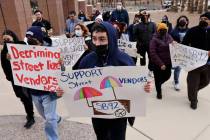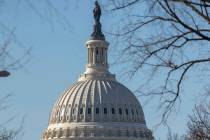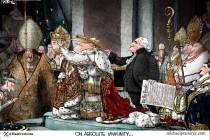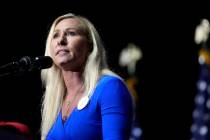Code of judicial conduct
The Nevada Supreme Court has approved revisions to the state code of judicial conduct, the first major update in nearly 20 years.
The regulations — most adopted from the recommendations of a study commission chaired by retired Chief Justice William Maupin — take effect Jan. 19. The changes are mostly for the better.
The most visible change may be a relaxing of rules on public comments by judges. Judges are still restricted from making public statements that might affect the outcome of a pending case — that’s sensible — but judges may now respond directly or through a third party to allegations in the media or elsewhere concerning their conduct. Judges and judicial candidates will also now be allowed to speak at or attend political gatherings or other events sponsored by a political organization or candidate for public office.
Good. Nevada elects its judges. Whether in good faith or not, both sitting judges and candidates have dealt with the rule by claiming they (as often paraphrased) “should not comment on a matter that might come before me” quite broadly. Such statements leave those citizens who go to the trouble to attend candidate forums scratching their heads as judicial candidates recite their academic credentials but otherwise refuse to answer even the most general questions about their constitutional or judicial philosophies.
It’s to be hoped the revised rules will allow common sense to prevail. Of course, judges and judicial candidates shouldn’t go into detail about specific cases not yet heard. But a judge’s beliefs about property rights, for instance, or the proper balance between freedom and government regulation, can impact rulings on a panoply of issues. Voters deserve better grounds for their choice than who has the prettiest billboards.
The old rules edged close to violation of the First Amendment freedom of speech, anyway, as the U.S. Supreme Court ruled in a recent case out of Minnesota.
And that’s the proper context from which to review a rule the court kept, prohibiting judges who are unopposed in an election from collecting campaign contributions.
It sounds like a no-brainer. But the rule still poses constitutional problems if collecting money to fund advertisements is properly seen as part of an act of “speech.”
The new code also will require judges to report misconduct by another judge or lawyer if they have information indicating a “substantial likelihood” of a violation, where existing rules require reporting only if a judge can demonstrate “known misconduct.” The new rule also mandates a judge take appropriate action when they believe another judge or lawyer’s performance is impaired by drugs, alcohol or a mental, emotional or physical condition.
In the real world, judges and established attorneys comprise a fairly tight social club. But the standards of conduct and competence should be high. The old standard — implying a judge had to play private detective and “get the goods” on a suspected wrongdoer before blowing the whistle — set the bar too high.


















